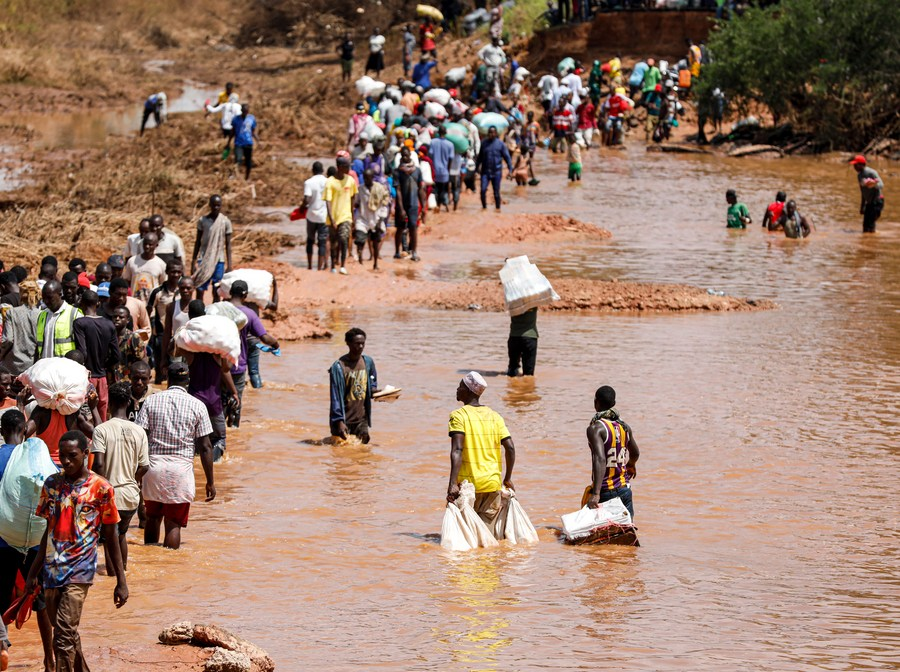By Zhu Xiaoyu
The 29th Conference of the Parties to the UN Framework Convention on Climate Change (COP29) in Baku, Azerbaijan, where world leaders, policymakers, scientists and activists discussed how to address the escalating biodiversity loss, resource scarcity, and other climate crises increasingly straining ecosystems and human societies, emphasized the urgency of transitioning from commitments to measurable actions.
Climate inequality
Communities in the Global South bear a disproportionate burden in the climate crisis, grappling with the dual challenge of adapting to worsening climate shocks while striving to mitigate future emissions. These regions have contributed minimally to historical greenhouse gas emissions but suffer the most severe consequences due to their geographical vulnerability, reliance on climate-sensitive livelihoods like agriculture, and limited financial and technological resources. This disparity is a stark reminder of the uneven distribution of responsibilities and risks in the global fight against climate change.
At COP29, the principle of climate justice emerged as a pivotal topic, emphasizing that any viable path forward must incorporate fairness and equity. This entails not only recognizing historical emissions responsibility but also providing the necessary resources – financial, technological and institutional – to ensure that vulnerable nations can effectively respond to climate challenges.
The conference also emphasized the crucial role of natural ecosystems in addressing climate change. Forests and wetland act as vital carbon sinks, absorbing significant amounts of carbon dioxide while providing critical ecosystem services such as water regulation, biodiversity preservation and disaster risk reduction. Regenerative agriculture, which focuses on restoring soil health and increasing carbon capture, was highlighted as an important strategy for enhancing food security and resilience to climate extremes.
Another major focus at COP29 was climate financing. In 2009 developed countries pledged $100 billion annually to assist developing nations in combating climate change. While this goal was finally exceeded in 2022, with $115.9 billion mobilized, the estimated current need has soared to approximately $1.5 trillion annually to meet the targets of nationally determined contributions.
But is simply providing money the solution? While necessary, it is far from sufficient. Climate finance is essential, yet relying solely on monetary contributions overlooks the systemic and cultural complexities of the issue. Furthermore, sustainable investment often struggles to reach the countries that need it most. As Selwin Hart, special adviser to the UN secretary-general and assistant secretary-general of the Climate Action Team, pointed out, "Countries representing two-thirds of the global population attracted just 15 percent of clean energy investments" in 2023.
Structural gaps and market failures are also significant contributors to climate inequality. For many developing countries, loans – even those offered on favorable terms – are not an optimal solution. Without access to advanced technology or robust industrial systems, these nations face the risk of financial exploitation, borrowing "green" money only to repay high interest rates. Despite their environmentally conscious branding, investors remain profit-driven. Consequently, inadequate infrastructure and limited technological capacity in these nations often lead to the misuse of capital, exacerbating inequality – a classic example of market failure.
As aptly said by United Nations Climate Change Secretariat Executive Secretary Simon Stiell, a successful new finance goal is in every country's clear interest. These words underscore the need for pragmatic, actionable solutions that go beyond mere financial commitments.

People wade through a flood-destroyed section at the Bangali-Garissa Road in Tana River County, Kenya, December 1, 2023. [Photo/Xinhua]
China's approach in Africa as an example
In this context, China's sustainable development initiatives in Africa offer valuable insights. Through South-South cooperation and the Belt and Road Initiative, China has provided a framework for addressing sustainability challenges with a more integrated and forward-looking approach.
One critical area is financing, where China has implemented various mechanisms to support Africa's transition to sustainability. Institutions such as the China Development Bank and the Export-Import Bank of China fund projects that comply with environmental standards.
To address concerns over debt sustainability, China has restructured loans for environmentally friendly initiatives, enabling African nations to prioritize green growth. Moreover, China fosters collaborations between its state-owned enterprises and African governments or private sector stakeholders, with a focus on renewable energy projects and eco-friendly infrastructure development.
Another significant contribution is technology transfer. China has made substantial investments in Africa's renewable energy sector, including solar, wind and hydropower projects. As a global leader in manufacturing affordable solar panels and wind turbines, it has facilitated greater access to clean energy technologies across the continent. This affordability plays a vital role in accelerating the adoption of renewable energy solutions in Africa.
Additionally, Chinese companies and institutions facilitate knowledge transfer to their African counterparts. Training programs funded by Chinese institutions in Africa provide hands-on expertise in areas such as solar installation, wind turbine maintenance and hydropower management. Joint ventures between Chinese and African firms empower local engineers with critical skills in green technology.
China's efforts to expand renewable energy access, building green infrastructure and promoting technological exchange, highlights its pivotal position in Africa's sustainability journey. This collaboration offers a compelling model for driving sustainable investments – a key priority at COP29.
COP29 served as a sobering reminder that mere fundraising is insufficient to address climate challenges. A realistic path forward requires investments that deliver bilateral benefits, ensuring fair, effective and sustainable climate solutions for all. The global community must adopt a multifaceted approach, integrating financing, technology and capacity building to advance global sustainability.
Zhu Xiaoyu, a special commentator on current affairs for CGTN, is an assistant professor at Lingnan College, Sun Yat-sen University in China. His research focuses on environmental, social and governance (ESG) and corporate finance.

 中文
中文



